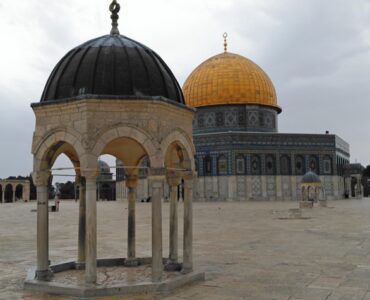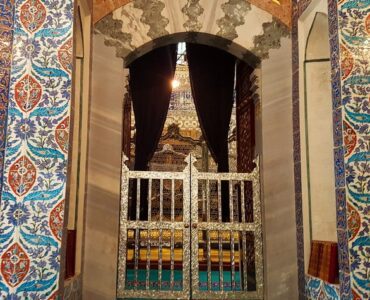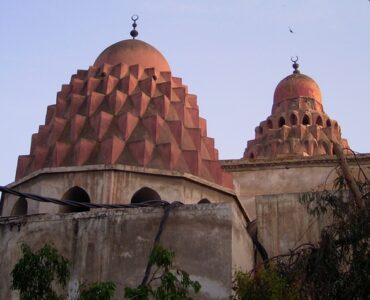Signed in the sixth year of Prophethood, the Treaty of Hudaybiyyah is a golden event in the history of Islam and an inspiration for Muslims worldwide. The treaty helped resolve a never-ending conflict between the cities of Mecca and Madinah while ensuring 10 years of peace and allowing the Muslims to perform Umrah.
Keep reading this article to learn more about the Treaty of Hudaybiyyah and its significance in spreading Islam within Saudi Arabia and across the borders of the Arabian Peninsula.
What Was the Treaty of Hudaybiyyah?
About 1,394 years ago, approximately six years after the migration to Madinah, Prophet Muhammad (PBUH) had a dream in which he was performing Tawaf around the Holy Kaaba in Mecca. The next day, Prophet Muhammad (PBUH) called his companions and narrated the dream.
The companions suggested the Messenger (PBUH) of Allah SWT go for Umrah, so a caravan of 1,400 pilgrims and 70 sacrificial camels walked towards Mecca.
On hearing about the congregation, the leaders of Quraish got alarmed, and even though they had no right to cease the unarmed Muslims, the pagan Quraish people stopped the Muslims from entering Makkah.
In fact, the Quraish were so frightened that they sent an army of 200 fighters under the leadership of Khalid bin Walid to prevent the Muslim caravan from stepping into the city. Seeing this, the Messenger (PBUH) of Allah SWT changed his route and settled in a lesser-known place on the western edge of the Haram territory named “Hudaibiyyah.”
Prophet Muhammad (PBUH) then sent Uthman bin Affaq (RA) to tell the Quraish that their purpose of the visit was to perform Umrah and not to fight. However, the Quraish kept him, and a rumor was spread stating that the Quraish had killed Uthman bin Affaq (RA).
On hearing this, Prophet Muhammad (PBUH) gathered the Muslims and asked them to prepare for war. When the Makkans got to know that tribes were aligning with Prophet Muhammad (PBUH) and they were ready to right, they quickly relayed Uthman bin Affaq (RA) and sent Sohbail bin Amr Al-Thaqafi as a representative to negotiate the terms of the peace treaty also known as the “Treaty of Hudaybiyyah.”
Otherwise known as Sulhul Hudaybiyyah, the Treaty of Hudaybiyyah was a contract of peace signed between the Muslims of Madinah and Quraish of Mecca under the famous acacia tree called “Bait Ridwan.”
Why Was the Treaty So Important to Muslims?
Even though some of the terms of the Treaty of Hudaybiyyah did not favor Muslims, its importance in Islamic history cannot be denied. After the treaty was signed, the people of Quraish started to recognise Prophet Muhammad (PBUH) as a leader of Madinah, and the Muslims were now permitted to make alliances with other tribes.
Furthermore, the treaty brought a peaceful end to the ongoing struggle amongst the polytheists and followers of Islam as people started to see Islam as a religion of peace. The ten-year truce allowed Muslims to freely preach Islam and peacefully deal with the enemies on the other side of the Arabian Peninsula.
What Does Hudaybiyyah Mean?
Hudaybiyyah is located approximately 24 kilometres from the Grand Mosque (Masjid al-Haram) on the old Jeddah road in Saudi Arabia. The name Hudaybiyyah reminds us of a grand victory of the Muslim nation without using strong militarism.
It is also narrated that the name Hudaybiyyah means “Place where friendship is made” and “God’s gift.”
Which Hijri Was the Treaty of Hudaybiyyah In?
The Treaty of Hudaybiyyah was signed in the month of Dhu al-Qudah in 6 AH (March 628 AD).
Who Broke the Treaty of Hudaybiyyah?
After two years of signing Sulhul Hudaibiyah, the polytheists of Mecca violated one of the most important terms of the treaty – abandoning the war. When the treaty was signed, the Banu Bakr tribe allied with the Quraish, and the Banu Khuza tribe partnered with the Muslims.
However, during a battle between the tribes, the Quraysh secretly took part in the ongoing war and killed some men of Banu Khuza, breaking the terms of the Treaty of Hudaibiyah. Realising their mistake, the Quraysh, under the leadership of Abu Sufyan, went to apologise to Prophet Muhammad (PBUH), but they weren’t pardoned.
The Messenger (PBUH) of Allah SWT gathered his army and marched toward Makkah to expand Islam.
When Was the Treaty Broken?
The Treaty of Hudaybiyyah was broken in 8 AH (629 – 630 AD) after the battle between Banu Khuza and Banu Bakr.
What Were the Conditions of the Treaty of Hudaybiyyah?
The Treaty of Hudaibiyah was a pivotal contract between the Quraish of Mecca and the Muslims of Madinah. After a prolonged and comprehensive discussion amongst the leaders of Makkah and Prophet Muhammad (PBUH) and his companions, the following terms of Sulhul Hudaibiyah were decided:
- The Muslims will go return to Madina without performing Umrah. However, the Muslims will be permitted to come back next year to peacefully stay in Makkah for 3 days and perform Umrah. The Muslims are only allowed to carry swords for protection, which should be kept underneath sheaths.
- The Treaty of Hudaybiyyah declared a 10-year armistice between both parties and advised everyone to live in harmony and peace during this time.
- According to the peace treaty terms, if anyone from Mecca entered Madinah, they should be returned safely to the Quraysh. However, if anyone from Medinah was found wandering in Mecca, they won’t be treated with the same courtesy.
- Any tribe or person who wishes to join Muhammad (PBUH) and sign the agreement alongside him will be free to do so. Similarly, any tribe or person who wishes to sign the agreement from the Quraish’s side will be free to do so.
- If any young person whose father was still alive went to Prophet Muhammad (PBUH) without permission from his guardian or father, he must be returned to Makkah. On the other hand, if anyone went from Madinah to Makkah, the Quraish people would be under no obligation to return them.
Lessons from the Treaty of Hudaybiyyah
The Treaty of Hudaybiyyah was a pivotal agreement between the Muslims and the Quraish.
It laid the foundation for the conquest of Makkah and taught Muslim generations a life-long lesson on solving conflicts with peace, patience, harmony, and gentleness. Some important lessons from Sulhul Hudaybiyyah are as follows:
Lesson 1 – You Can Resolve Any Problem with Patience
While staying calm amid a crisis is difficult, patience and thinking straight give you the power to resolve, ensuring that the results are in your favour.
For example, even though while it seemed like the terms and conditions of the Treaty of Hudaybiyyah were not in the favour of Muslims, it was Prophet Muhammad’s (PBUH) peace, patience, and determination that turned the treaty in their favour and ensured peace in the years to come.
Lesson 2 – You Should Always Honour Your Words
Another important lesson that Sulhul Hudaibiyah taught us is to honour and value the commitments made. Regardless of what happens, if you have promised something, you should make sure to keep your word.
Because the people of Quraish didn’t follow the terms of the agreement and participated in the battle, Prophet Muhammad (PBUH) dissolved the treaty, led an army to invade Makkah, and defeated the Quraish with the help of Allah SWT.
Lesson 3 – No Matter How Powerful You Are, Raising Your Sword Isn’t the Answer
When Prophet Muhammad (PBUH) and the 1400 Muslim caravan arrived at Hudaibiyah, he could have easily raised the sword against the brutal Quraish and won. However, the Messenger (PBUH) of Allah SWT decided otherwise.
Despite all the challenges, Prophet Muhammad (PBUH) remained calm and chose to settle things peacefully. The points of the Treaty of Hudaibiyah teach us that no matter how brave and strong you are, you must prioritize the path of peace rather than opting for violence.
Lesson 4 – Use Your Power to Become a Strong Leader
Whether being a monitor at school, a speaker of an organisation, or an elder sibling, we all have a leader within ourselves. The Treaty of Hudaibiyah teaches us to use this responsibility to do the right thing and create a positive impact on those influenced by us.
Throughout the event of Hudaibiyah, we have seen how Prophet Muhammad (PBUH) showed enduring leadership qualities and tried to console the Muslim Ummah and inspire them to do the right thing rather than feeling discouraged and lost.
You must also remember that a leader isn’t always right. Thus, it is advised to consult with your companions to ensure you make the right decision, just like Prophet Muhammad (PBUH) consulted with his wife, Ummu Salamah (RA).
Lesson 5 – All Muslims Are Brother
The event of Hudaibiyah reminds us that all Muslims are brothers. When Uthman bin Affaq (RA) was asked to make Tawaf by the Quraish, he declined without any hesitation out of love and respect for Prophet Muhammad (PBUH) and fellow Muslims.
Thus, Muslims should feel the same for other believers around the globe and should honour, love, respect, and care for one another.
Treaty of Hudaybiyyah Mentioned in the Quran
Most of the conditions of the Treaty of Hudaibiyah favored the pagan people of Quraysh. Muslims were heartbroken knowing they had to return to Madinah and return the next year to perform Umrah.
However, the Messenger (PBUH) of Allah SWT was a pioneer, and so he knew that it was a great triumph in the history of Islam and would result in increasing not only the number of Muslims in the Arabian Peninsula but also Muslims would have full liberty to preach Islam.
On returning from Hudaibiya, the beloved Prophet Muhammad (PBUH) received a revelation from Allah SWT, stating that the Almighty had placed a seal of honour on the treaty and named it “Fatah Al-Mubeen,” which meant manifest victory.
In the verse, Allah SWT also rewarded His blessings and pleasure to all the companions who had taken the oath of allegiance under an acacia tree called Bait Ridwan. Allah SWT termed His protection upon Prophet Muhammad (PBUH) and the Muslims. The first verse of the Surah is given below:
إِنَّا فَتَحْنَا لَكَ فَتْحًۭا مُّبِينًۭا
Transliteration: Innaa fatahnaa laka Fatham Mubeenaa
Translation: Indeed, We have granted you a clear triumph ˹O Prophet˺I [Holy Quran, 48:01]
The Surah Was Revealed After the Treaty of Hudaibiya
Surah al-Fath, meaning “victory” or “triumph,” was revealed in the 6th AH in the city of Madinah after the Treaty of Hudibiya was signed between the polytheists of Makkah and the Muslims of Madinah.
The Surah was revealed to comfort the depressed, dejected, and disheartened believers, especially Umar (RA). The divine revelation came down at Dajnan, Prophet Muhammad (PBUH) summoned the Muslim caravan and said, “Today such a thing has been sent down to me, which is more valuable to me than the world and what it contains.”
The Messenger (PBUH) of Allah SWT then recited the following verses of Surah al-Fath to the Muslims:
إِنَّا فَتَحْنَا لَكَ فَتْحًۭا مُّبِينًۭا ١
لِّيَغْفِرَ لَكَ ٱللَّهُ مَا تَقَدَّمَ مِن ذَنۢبِكَ وَمَا تَأَخَّرَ وَيُتِمَّ نِعْمَتَهُۥ عَلَيْكَ وَيَهْدِيَكَ صِرَٰطًۭا مُّسْتَقِيمًۭا ٢
وَيَنصُرَكَ ٱللَّهُ نَصْرًا عَزِيزًا ٣
هُوَ ٱلَّذِىٓ أَنزَلَ ٱلسَّكِينَةَ فِى قُلُوبِ ٱلْمُؤْمِنِينَ لِيَزْدَادُوٓا۟ إِيمَـٰنًۭا مَّعَ إِيمَـٰنِهِمْ ۗ وَلِلَّهِ جُنُودُ ٱلسَّمَـٰوَٰتِ وَٱلْأَرْضِ ۚ وَكَانَ ٱللَّهُ عَلِيمًا حَكِيمًۭا ٤
لِّيُدْخِلَ ٱلْمُؤْمِنِينَ وَٱلْمُؤْمِنَـٰتِ جَنَّـٰتٍۢ تَجْرِى مِن تَحْتِهَا ٱلْأَنْهَـٰرُ خَـٰلِدِينَ فِيهَا وَيُكَفِّرَ عَنْهُمْ سَيِّـَٔاتِهِمْ ۚ وَكَانَ ذَٰلِكَ عِندَ ٱللَّهِ فَوْزًا عَظِيمًۭا ٥
وَيُعَذِّبَ ٱلْمُنَـٰفِقِينَ وَٱلْمُنَـٰفِقَـٰتِ وَٱلْمُشْرِكِينَ وَٱلْمُشْرِكَـٰتِ ٱلظَّآنِّينَ بِٱللَّهِ ظَنَّ ٱلسَّوْءِ ۚ عَلَيْهِمْ دَآئِرَةُ ٱلسَّوْءِ ۖ وَغَضِبَ ٱللَّهُ عَلَيْهِمْ وَلَعَنَهُمْ وَأَعَدَّ لَهُمْ جَهَنَّمَ ۖ وَسَآءَتْ مَصِيرًۭا ٦
وَلِلَّهِ جُنُودُ ٱلسَّمَـٰوَٰتِ وَٱلْأَرْضِ ۚ وَكَانَ ٱللَّهُ عَزِيزًا حَكِيمًا ٧
إِنَّآ أَرْسَلْنَـٰكَ شَـٰهِدًۭا وَمُبَشِّرًۭا وَنَذِيرًۭا ٨
لِّتُؤْمِنُوا۟ بِٱللَّهِ وَرَسُولِهِۦ وَتُعَزِّرُوهُ وَتُوَقِّرُوهُ وَتُسَبِّحُوهُ بُكْرَةًۭ وَأَصِيلًا ٩
إِنَّ ٱلَّذِينَ يُبَايِعُونَكَ إِنَّمَا يُبَايِعُونَ ٱللَّهَ يَدُ ٱللَّهِ فَوْقَ أَيْدِيهِمْ ۚ فَمَن نَّكَثَ فَإِنَّمَا يَنكُثُ عَلَىٰ نَفْسِهِۦ ۖ وَمَنْ أَوْفَىٰ بِمَا عَـٰهَدَ عَلَيْهُ ٱللَّهَ فَسَيُؤْتِيهِ أَجْرًا عَظِيمًۭا ١٠
سَيَقُولُ لَكَ ٱلْمُخَلَّفُونَ مِنَ ٱلْأَعْرَابِ شَغَلَتْنَآ أَمْوَٰلُنَا وَأَهْلُونَا فَٱسْتَغْفِرْ لَنَا ۚ يَقُولُونَ بِأَلْسِنَتِهِم مَّا لَيْسَ فِى قُلُوبِهِمْ ۚ قُلْ فَمَن يَمْلِكُ لَكُم مِّنَ ٱللَّهِ شَيْـًٔا إِنْ أَرَادَ بِكُمْ ضَرًّا أَوْ أَرَادَ بِكُمْ نَفْعًۢا ۚ بَلْ كَانَ ٱللَّهُ بِمَا تَعْمَلُونَ خَبِيرًۢا ١١
بَلْ ظَنَنتُمْ أَن لَّن يَنقَلِبَ ٱلرَّسُولُ وَٱلْمُؤْمِنُونَ إِلَىٰٓ أَهْلِيهِمْ أَبَدًۭا وَزُيِّنَ ذَٰلِكَ فِى قُلُوبِكُمْ وَظَنَنتُمْ ظَنَّ ٱلسَّوْءِ وَكُنتُمْ قَوْمًۢا بُورًۭا ١٢
وَمَن لَّمْ يُؤْمِنۢ بِٱللَّهِ وَرَسُولِهِۦ فَإِنَّآ أَعْتَدْنَا لِلْكَـٰفِرِينَ سَعِيرًۭا ١٣
وَلِلَّهِ مُلْكُ ٱلسَّمَـٰوَٰتِ وَٱلْأَرْضِ ۚ يَغْفِرُ لِمَن يَشَآءُ وَيُعَذِّبُ مَن يَشَآءُ ۚ وَكَانَ ٱللَّهُ غَفُورًۭا رَّحِيمًۭا ١٤
سَيَقُولُ ٱلْمُخَلَّفُونَ إِذَا ٱنطَلَقْتُمْ إِلَىٰ مَغَانِمَ لِتَأْخُذُوهَا ذَرُونَا نَتَّبِعْكُمْ ۖ يُرِيدُونَ أَن يُبَدِّلُوا۟ كَلَـٰمَ ٱللَّهِ ۚ قُل لَّن تَتَّبِعُونَا كَذَٰلِكُمْ قَالَ ٱللَّهُ مِن قَبْلُ ۖ فَسَيَقُولُونَ بَلْ تَحْسُدُونَنَا ۚ بَلْ كَانُوا۟ لَا يَفْقَهُونَ إِلَّا قَلِيلًۭا ١٥
قُل لِّلْمُخَلَّفِينَ مِنَ ٱلْأَعْرَابِ سَتُدْعَوْنَ إِلَىٰ قَوْمٍ أُو۟لِى بَأْسٍۢ شَدِيدٍۢ تُقَـٰتِلُونَهُمْ أَوْ يُسْلِمُونَ ۖ فَإِن تُطِيعُوا۟ يُؤْتِكُمُ ٱللَّهُ أَجْرًا حَسَنًۭا ۖ وَإِن تَتَوَلَّوْا۟ كَمَا تَوَلَّيْتُم مِّن قَبْلُ يُعَذِّبْكُمْ عَذَابًا أَلِيمًۭا ١٦
لَّيْسَ عَلَى ٱلْأَعْمَىٰ حَرَجٌۭ وَلَا عَلَى ٱلْأَعْرَجِ حَرَجٌۭ وَلَا عَلَى ٱلْمَرِيضِ حَرَجٌۭ ۗ وَمَن يُطِعِ ٱللَّهَ وَرَسُولَهُۥ يُدْخِلْهُ جَنَّـٰتٍۢ تَجْرِى مِن تَحْتِهَا ٱلْأَنْهَـٰرُ ۖ وَمَن يَتَوَلَّ يُعَذِّبْهُ عَذَابًا أَلِيمًۭا ١٧
۞ لَّقَدْ رَضِىَ ٱللَّهُ عَنِ ٱلْمُؤْمِنِينَ إِذْ يُبَايِعُونَكَ تَحْتَ ٱلشَّجَرَةِ فَعَلِمَ مَا فِى قُلُوبِهِمْ فَأَنزَلَ ٱلسَّكِينَةَ عَلَيْهِمْ وَأَثَـٰبَهُمْ فَتْحًۭا قَرِيبًۭا ١٨
وَمَغَانِمَ كَثِيرَةًۭ يَأْخُذُونَهَا ۗ وَكَانَ ٱللَّهُ عَزِيزًا حَكِيمًۭا ١٩
وَعَدَكُمُ ٱللَّهُ مَغَانِمَ كَثِيرَةًۭ تَأْخُذُونَهَا فَعَجَّلَ لَكُمْ هَـٰذِهِۦ وَكَفَّ أَيْدِىَ ٱلنَّاسِ عَنكُمْ وَلِتَكُونَ ءَايَةًۭ لِّلْمُؤْمِنِينَ وَيَهْدِيَكُمْ صِرَٰطًۭا مُّسْتَقِيمًۭا ٢٠
وَأُخْرَىٰ لَمْ تَقْدِرُوا۟ عَلَيْهَا قَدْ أَحَاطَ ٱللَّهُ بِهَا ۚ وَكَانَ ٱللَّهُ عَلَىٰ كُلِّ شَىْءٍۢ قَدِيرًۭا ٢١
وَلَوْ قَـٰتَلَكُمُ ٱلَّذِينَ كَفَرُوا۟ لَوَلَّوُا۟ ٱلْأَدْبَـٰرَ ثُمَّ لَا يَجِدُونَ وَلِيًّۭا وَلَا نَصِيرًۭا ٢٢
سُنَّةَ ٱللَّهِ ٱلَّتِى قَدْ خَلَتْ مِن قَبْلُ ۖ وَلَن تَجِدَ لِسُنَّةِ ٱللَّهِ تَبْدِيلًۭا ٢٣
وَهُوَ ٱلَّذِى كَفَّ أَيْدِيَهُمْ عَنكُمْ وَأَيْدِيَكُمْ عَنْهُم بِبَطْنِ مَكَّةَ مِنۢ بَعْدِ أَنْ أَظْفَرَكُمْ عَلَيْهِمْ ۚ وَكَانَ ٱللَّهُ بِمَا تَعْمَلُونَ بَصِيرًا ٢٤
هُمُ ٱلَّذِينَ كَفَرُوا۟ وَصَدُّوكُمْ عَنِ ٱلْمَسْجِدِ ٱلْحَرَامِ وَٱلْهَدْىَ مَعْكُوفًا أَن يَبْلُغَ مَحِلَّهُۥ ۚ وَلَوْلَا رِجَالٌۭ مُّؤْمِنُونَ وَنِسَآءٌۭ مُّؤْمِنَـٰتٌۭ لَّمْ تَعْلَمُوهُمْ أَن تَطَـُٔوهُمْ فَتُصِيبَكُم مِّنْهُم مَّعَرَّةٌۢ بِغَيْرِ عِلْمٍۢ ۖ لِّيُدْخِلَ ٱللَّهُ فِى رَحْمَتِهِۦ مَن يَشَآءُ ۚ لَوْ تَزَيَّلُوا۟ لَعَذَّبْنَا ٱلَّذِينَ كَفَرُوا۟ مِنْهُمْ عَذَابًا أَلِيمًا ٢٥
إِذْ جَعَلَ ٱلَّذِينَ كَفَرُوا۟ فِى قُلُوبِهِمُ ٱلْحَمِيَّةَ حَمِيَّةَ ٱلْجَـٰهِلِيَّةِ فَأَنزَلَ ٱللَّهُ سَكِينَتَهُۥ عَلَىٰ رَسُولِهِۦ وَعَلَى ٱلْمُؤْمِنِينَ وَأَلْزَمَهُمْ كَلِمَةَ ٱلتَّقْوَىٰ وَكَانُوٓا۟ أَحَقَّ بِهَا وَأَهْلَهَا ۚ وَكَانَ ٱللَّهُ بِكُلِّ شَىْءٍ عَلِيمًۭا ٢٦
لَّقَدْ صَدَقَ ٱللَّهُ رَسُولَهُ ٱلرُّءْيَا بِٱلْحَقِّ ۖ لَتَدْخُلُنَّ ٱلْمَسْجِدَ ٱلْحَرَامَ إِن شَآءَ ٱللَّهُ ءَامِنِينَ مُحَلِّقِينَ رُءُوسَكُمْ وَمُقَصِّرِينَ لَا تَخَافُونَ ۖ فَعَلِمَ مَا لَمْ تَعْلَمُوا۟ فَجَعَلَ مِن دُونِ ذَٰلِكَ فَتْحًۭا قَرِيبًا ٢٧
هُوَ ٱلَّذِىٓ أَرْسَلَ رَسُولَهُۥ بِٱلْهُدَىٰ وَدِينِ ٱلْحَقِّ لِيُظْهِرَهُۥ عَلَى ٱلدِّينِ كُلِّهِۦ ۚ وَكَفَىٰ بِٱللَّهِ شَهِيدًۭا ٢٨
مُّحَمَّدٌۭ رَّسُولُ ٱللَّهِ ۚ وَٱلَّذِينَ مَعَهُۥٓ أَشِدَّآءُ عَلَى ٱلْكُفَّارِ رُحَمَآءُ بَيْنَهُمْ ۖ تَرَىٰهُمْ رُكَّعًۭا سُجَّدًۭا يَبْتَغُونَ فَضْلًۭا مِّنَ ٱللَّهِ وَرِضْوَٰنًۭا ۖ سِيمَاهُمْ فِى وُجُوهِهِم مِّنْ أَثَرِ ٱلسُّجُودِ ۚ ذَٰلِكَ مَثَلُهُمْ فِى ٱلتَّوْرَىٰةِ ۚ وَمَثَلُهُمْ فِى ٱلْإِنجِيلِ كَزَرْعٍ أَخْرَجَ شَطْـَٔهُۥ فَـَٔازَرَهُۥ فَٱسْتَغْلَظَ فَٱسْتَوَىٰ عَلَىٰ سُوقِهِۦ يُعْجِبُ ٱلزُّرَّاعَ لِيَغِيظَ بِهِمُ ٱلْكُفَّارَ ۗ وَعَدَ ٱللَّهُ ٱلَّذِينَ ءَامَنُوا۟ وَعَمِلُوا۟ ٱلصَّـٰلِحَـٰتِ مِنْهُم مَّغْفِرَةًۭ وَأَجْرًا عَظِيمًۢا ٢٩
Treaty of Hudaybiyyah – Summary
The Treaty of Hudaybiyyah aimed to bring peace and harmony between the states of Madinah and Makkah. It allowed Muslims to perform the rituals of Umrah peacefully and spread Islam across the nation.
While the Treaty of Hudaybiyyah taught us many lessons, the most important one was that you should not feel depressed when things don’t work out as planned. Instead, have faith and remember that Allah SWT is indeed the best planner.
Today, a mosque is constructed over the exact spot where Prophet Muhammad (PBUH) performed Salah during his stay at Hudaibiya.
Thus, if you get a chance to visit Masjid al-Hudaibiyah, use the opportunity to think and pray for the companions who took an oath under Bait Ridwan to sacrifice their lives for Islam.



















